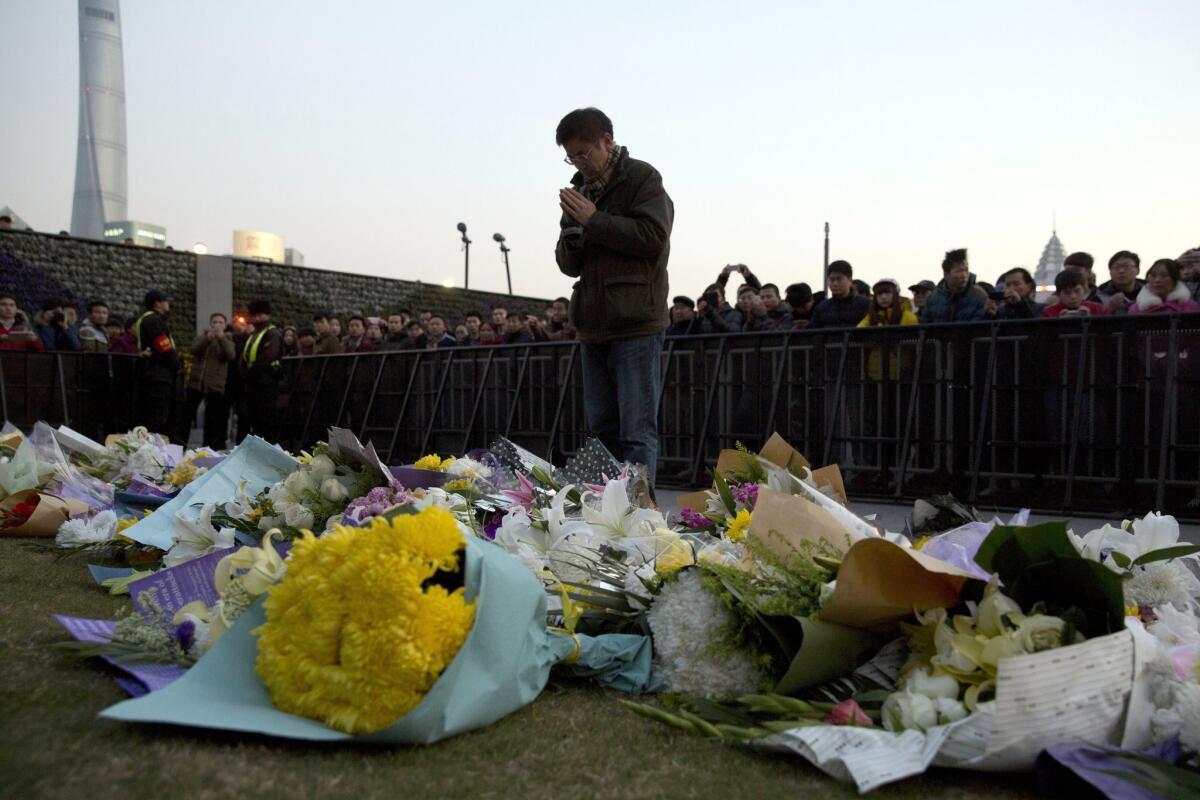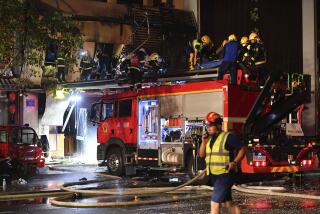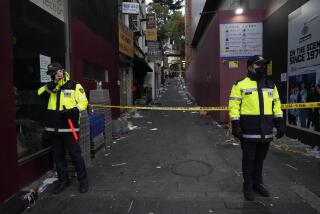Four fired, 7 punished in Shanghai for deadly New Year’s Eve stampede

- Share via
Reporting from Beijing — Local officials failed to adequately assess risks and deploy sufficient police ahead of the stampede in Shanghai on New Year’s Eve that left 36 people dead and 49 injured, the city government said in its official investigation report released Wednesday.
But only district-level officials within Shanghai are being punished, as local authorities tried to contain the political impact of the tragedy. Four officials from Huangpu district, including the Communist Party leader and the police chief of the district, were fired and seven other officials were punished.
The tourism bureau in Huangpu district was faulted for waiting until Dec. 30 to announce that the traditional New Year’s Eve countdown celebration along the Bund waterfront had been canceled. As a result, few people knew of the change of plans.
“Many local residents and tourists thought the annual New Year’s Eve countdown celebrations in the Bund area would take place as usual,” the official report said.
Only 350 police officers, 108 city management staff and 100 paramilitary officers were deployed in the Bund area, where tens of thousands of people had massed. In previous years, staffing levels had been much higher.
“The number of security personnel in the Bund area was insufficient,” Xiong Xinguan, head of Shanghai’s emergency reaction office, said at a briefing Wednesday announcing the investigation results.
Making matters worse, he said, “after witnessing the number of people in the Bund area continue to grow from 8 p.m. on Dec. 31, police in Huangu District failed to notify the city’s monitoring office in a timely manner and didn’t ask the local government to issue warnings to the public.”
Most of those who died were people in their early 20s, though the youngest victim was a 12-year-old boy. Local authorities in Shanghai said 45 of the 49 people injured in the stampede have been released from the hospital.
A compensation plan for the deceased and injured victims has not been announced yet. In a 2010 building fire in Shanghai that killed 58 people, each victim’s family received $154,557 in compensation.
Twelve days after the stampede, the Chinese business magazine Caixin published a detailed story exploring who should be held accountable for the incident. The article said that local officials in Huangpu had dined at a luxury Japanese restaurant in the same area the night of the stampede.
As part of the ongoing anti-corruption and austerity campaign initiated by Chinese President Xi Jinping in late 2012, Shanghai city government’s disciplinary office launched an investigation into the allegations made by Caixin and released their findings via social media Wednesday.
According to the disciplinary office, after participating in New Year’s celebration events in the Bund area around 11 p.m. on Dec. 31, Huangpu district Communist Party chief Zhou Wei was invited to dine at the restaurant by the state-owned enterprise that owns the eatery. A group of officials from the Huangpu joined Zhou for the late dinner that included sushi, noodles and Japanese wine with a total bill of $434. The chairman of the company that owns the restaurant covered the bill for Zhou’s group.
Three officials including Zhou who attended the dinner were all fired for negligence when the stampede happened. “They violated regulations from the party and used public funds for dinner and had very negative social impact,” the city’s information office said.
Seven other officials who attended the dinner with Zhou were also punished, but not for their role in the stampede.
Social commentators on Chinese social media questioned whether the lower-level officials were being made into scapegoats on account of their pricey dinner.
“In fact, how much money they spent on a late-night dinner had nothing to do with the stampede itself,” wrote Yao Bo, a commenter who goes by the name Wuyue Sanren on Weibo. “Looks like it’s just their bad luck that they chose to eat at the wrong time.”
Tommy Yang in the Times’ Beijing bureau contributed to this report.
More to Read
Sign up for Essential California
The most important California stories and recommendations in your inbox every morning.
You may occasionally receive promotional content from the Los Angeles Times.










